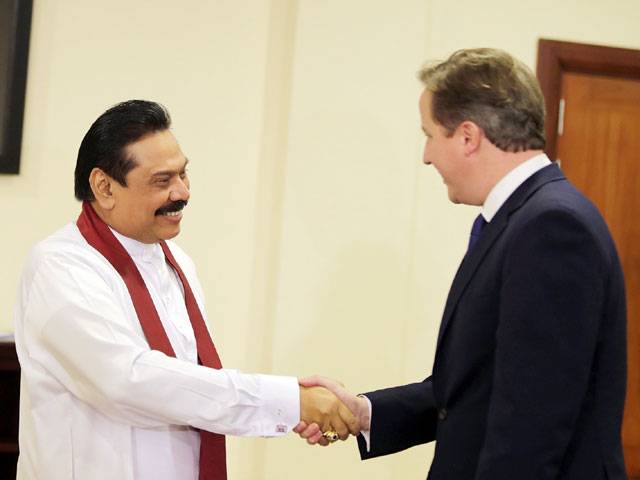COLOMBO - Britain’s David Cameron put Sri Lanka on notice Saturday to address allegations of war crimes within months or else he would lead a push for action at the UN.
Speaking at a troubled Commonwealth summit in Colombo, the British premier warned his host, President Mahinda Rajapakse, that pressure over alleged abuses at the end of Sri Lanka’s ethnic conflict was not about to go away.
But Rajapakse responded by insisting that Sri Lanka should be trusted to conduct its own inquiries, telling his critics: “People in glass houses mustn’t throw stones.”
Cameron, who made an historic visit to the former war zone on Friday, also told of how he had “frank” exchanges with Rajapakse on his return. “The Sri Lankan government needs to go further and faster on human rights and reconciliation,” he told a press conference.
“Ultimately all this is about reconciliation and closure and healing to this country, which now has the chance, if it takes it, of a much brighter future but that will only happen by dealing with these issues and not ignoring them.
“I’m hugely optimistic about the country’s future. The message I have is that this issue will not go away and needs to be pursued vigorously.” The UN and rights group say as many as 40,000 civilians may have been killed in the final stages of the war in May 2009 when Tamil Tiger rebels were crushed by government troops.
However Rajapakse has denied any civilians were killed and has also blocked all calls for an independent probe into claims of war crimes committed by government forces against the Tamil population in the Jaffna region.
Cameron said Rajapakse wanted more time to address the claims but told him to deliver by March or else he would push for an international investigation through UN human rights bodies. “Let me be very clear, if an investigation is not completed by March, then I will use our position on the UN Human Rights Council to work with the UN Human Rights Commission and call for a full, credible and independent international inquiry.” Rajapakse later told reporters that Cameron was welcome to his view but added Sri Lanka must be allowed to complete its own investigation in its own time. “They have to trust us,” he said. “Pressure won’t do anything. ... It’s much better to wait rather than demand or dictate.” “We will take our own time and investigate, you must wait,” he added.
In an interview with AFP, the powerful Economic Development Minister Basil Rajapakse - who is also the president’s brother - totally rejected the idea of foreign investigators operating on Sri Lankan soil. “Why should we have an international inquiry?” he said.
“Definitely, we are not going to allow it.”
Asked about Cameron’s March deadline, the minister said: “They can’t give dates. It is not fair.”
Cameron upstaged the first day of the three-day meeting Friday by travelling to Jaffna which bore the main brunt of the 37-year war, meeting local ethnic Tamils who lost loved ones or were left homeless.
He was the first foreign leader to visit Jaffna since Sri Lanka, a former British colony, gained independence in 1948.
While Sri Lanka had hoped the summit would showcase its revival since troops from the mainly Sinhalese government crushed the Tigers, Cameron’s visit and boycotts have torpedoed its strategy.
Cameron received an emotional reception in Jaffna from locals who told him of their plight during the war and in its aftermath.
Their desperation was underlined when two women tried to hurl themselves at his car, while others mobbed his convoy, clutching pictures of loved ones who were killed in a conflict which claimed more than 100,000 lives.
Cameron held talks late Friday with Rajapakse, acknowledging that “very strong views were expressed on both sides”.
The talks would have added to Rajapakse’s anger with his peers after the leaders of Canada, India and Mauritius stayed away.
Mauritian Prime Minister Navin Chandra Ramgoolam says he is no longer willing to host the next gathering in 2015 as “human rights are more important than hosting a Commonwealth summit”.
Since the war, Sri Lanka’s economy has grown at rates of up to 8.2 per cent and major infrastructure projects such as a new $350 million highway linking Colombo to the main airport bear testimony to its revival.
The summit is meant to focus on issues such as poverty reduction and climate change but press conferences have been dominated by questions over the war crimes issue.
After detailing how leaders had spent the day addressing topics such as debt relief and youth issues, the Comonwealth’s Secretary General Kamalesh Sharma was asked to explain the widespread absence of leaders.
Only 27 heads of government are attending the 53-nation bloc’s biennial summit.
“As far as the outcomes are concerned, you will find at the end of this CHOGM, that it has been very productive, and it has been very meaningful and successful,” said Sharma, seated alongside Rajapakse.
Thursday, April 18, 2024
Cameron puts Sri Lanka on notice over war crimes

Courage vs Hypocrisy
April 18, 2024
Modi’s Pulwama-Like Operations
April 18, 2024
Justice denied
April 18, 2024
AI dilemmas unveiled
April 18, 2024
Tax tangle
April 18, 2024
Rail Revival
April 17, 2024
Addressing Climate Change
April 17, 2024
Saudi Investment
April 17, 2024
Political Reconciliation
April 16, 2024
Pricing Pressures
April 16, 2024
Workforce inequality
April 17, 2024
New partnerships
April 17, 2024
Shikarpur crisis
April 17, 2024
Peace quest
April 17, 2024
Democratic harmony
April 16, 2024
ePaper - Nawaiwaqt
Advertisement
Nawaiwaqt Group | Copyright © 2024





